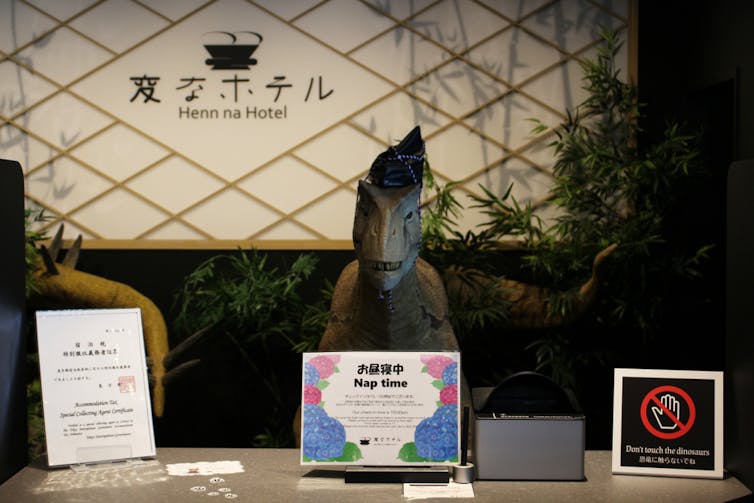This article was written by Lionel Sitz, professor of marketing at emlyon business school, and Anne-Christelle Vogler, director at Kea & Partners and co-author of the white paper “IA et IE, la révolution des compétences”.
As the world’s leading robot manufacturer, Japan is particularly well placed to test new robotic applications. In 2015, the media reported the launch of a new type of hotel near Nagasaki: the Henn Na Hotel, staffed almost entirely by robots.
The hotel’s stated objective was to introduce state-of-the-art technologies to increase efficiency and, in the long term, to run the first hotel without human staff. Welcomed by a robot dinosaur, customers were surrounded by all kinds of robotic applications, from the robot concierge to the robot bus, and not forgetting the robot trash collector.
However, in January 2019, after three-and-a-half years of operation, the hotel announced that it was laying off half of its 243 robots, considering them to be unproductive.
Although anecdotal, this experience renews the debate on the place of robots within organizations and, in this case, in customer relations. It raises the possibility of delegating tasks, or even an entire strategic activity such as customer relations, to robots.
Hard skills, soft skills
At first glance, the logical response to this question clearly appears to be “no”. However, the reality is more complex. Delegating does not mean leaving things unchecked. Delegating involves defining the scope of responsibilities and decisions, objectives to be achieved, and evaluation criteria. This involves management: regular supervision and milestones. The Henn-Na Hotel had also employed (human) managers to manage all of its activities behind the scenes but had not clearly defined the respective perimeters of these human and robotic operators. The question therefore arises as to whether it is possible to delegate the entire customer relations process to robots given that it is currently performed by human employees?
The question to ask is rather what tasks can we delegate to machines or, in other words, how should we redistribute activities between humans and increasingly competent machines?

Performing this division of tasks raises the question of the value created for the company: which activities and which stages of the journey are highly value-creating and sources of differentiation? Which are commodities?
Undertaking this work allows us to determine whether to mobilize technical knowledge and expertise (hard skills) or relational and emotional interpersonal skills (soft skills). Hard skills involve the ability to perform clearly defined tasks quickly and proficiently, with precision and reliability. In this respect, machines are particularly effective at performing repetitive, uncomplicated, and arduous tasks. For this reason, they are heavily used by companies in industrial manufacturing operations, and today’s factories are filled with robots that perform an increasing number of tasks. Robots, being machines, are not limited by issues of physical or psychological fatigue. Their precision allows them to endlessly repeat the same gesture with a degree of accuracy unattainable by human hand. The main advantage of robots is therefore their outstanding expertise.
The development of the IoT and of algorithms has made it possible to endow objects with “intelligence”. This has given new impetus to robotization, with robots now able to efficiently process and store data. Knowledge has thus become new territory for machines. Storage, processing, speed – robots are now able to efficiently sift through large amounts of data at a speed far exceeding that of human operators. For all these reasons, hard skills are the key strength of robots in customer relations. Soft skills, on the other hand, require relational adaptability, situational intelligence, empathy, etc. Robots and their algorithms are not yet able to develop the know-how required to manage ambiguous, complex, or unexpected situations.
Adaptability and recognition
Let’s go back to the case of the Henn-Na Hotel, which decided to delegate its customer relations to machines. What expectations do customers in the hospitality sector have? Efficiency, of course, with a speedy check-in and a room that meets their expectations; but also tailored responses and a service that adapts to quickly propose solutions to unexpected requests. This means that standardized and defined contact moments can easily be delegated to robots. However, a company’s relationships with its customers cannot be reduced to standardized operations because they require adaptability and recognition. For this reason, customer relations require relational and emotional skills.

The slogan of the Henn Na Hotel was “the ultimate in efficiency”. But the gamble of fully robotized customer relations has failed so far. This failure does not mean, however, that it is not possible to delegate tasks to robots, but rather that we cannot delegate all activities and all stages of the customer relations process. This delegation cannot cover the entire customer relations process and must be reserved for interactions that require little adaptability and emotional intelligence. Answering a standard question (“What time is it?”), checking-in customers in a limited number of languages, etc. are tasks that robots are currently able to perform (clearly with supervision as with self-service checkouts). But they are not yet able to help people by taking into account their personal situations and desires or to understand complex or ambiguous requests – all tasks that are essential for effective customer relationship management.
What will the customer relations of tomorrow look like? Speed and rigor when completing tasks are crucial and robots will certainly play an increasing role in delivering on this basic promise. In a hyper-competitive environment, this is necessary but not sufficient. The difference lies in the ability to deliver a customer relationship that is “uncopyable”, surprising, and that delivers a unique experience. This is where the human playground is. Customer relations will be simultaneously increasingly robotic AND increasingly human: companies that effectively combine and supervise both elements will have a real head start.
A second question then arises: can we delegate management to a robot?
[/fusion_title][fusion_text columns=”” column_min_width=”” column_spacing=”” rule_style=”default” rule_size=”” rule_color=”” class=”” id=””]
As a professor, I mainly teach branding, consumer behaviour, sociology and the anthropology of consumption. As a researcher, I work on brand communities and the relationships between ethnicity and consumption, consumer resistance and shopping experiences. My research interests concern, among other things, brands and their status in our culture, lifestyles in a connected society, consumers passions and the relationships between ethnicity and consumption. I am particularly interested in consumer social movements, the construction of collective consumer identity, sociology, anthropology, visual and qualitative methods.
More information on Lionel Sitz:
• His CV online
• His Viadeo page
• His ResearchGate page
• His Academia page



Recent Comments